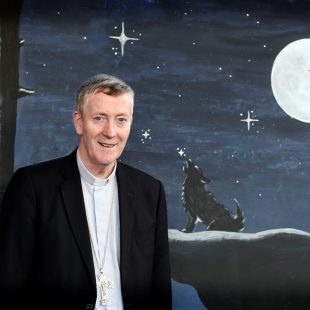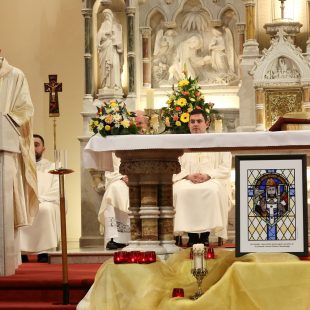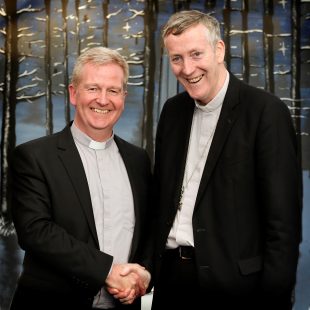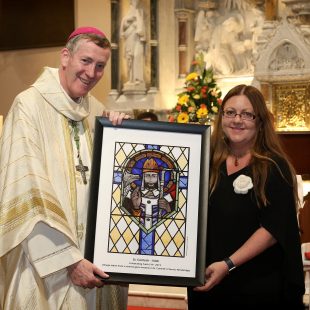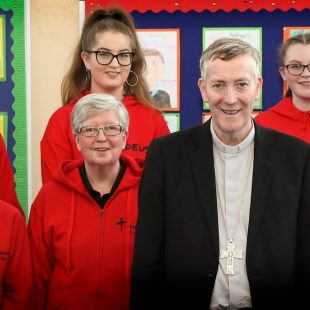Bishop Denis celebrated Mass on Saturday 4th May in St. Conleth’s Church, Newbridge on the occasion of the 1,500th Anniversary of Death of St. Conleth
Introduction:
We gather this evening in honour of St. Conleth on this the 1,500th, sesquimillennial anniversary of his death. As I mentioned at last Monday’s opening of your Annual Novena, Newbridge is the only parish in Ireland that I know of, named after this saint. This is a celebration of the story of faith rooted by Conleth in these parts.
How wonderful it is that we are joined by First Communicants as they continue their preparation for receiving Jesus into their little lives over the coming weeks. I commend their parents, teachers, priests and parish sacramental teams who are accompanying these children on their journey. In this evening’s gospel we, like the First Communicants are invited to breakfast with Jesus and his invitation to each of us is to ‘come and eat’.
And after breakfast there is a wonderful dialogue between Simon Peter and Jesus on love and the depth and quality of that love. It ends off with an indication of the kind of death Peter would one day endure for his faith.
Our gathering this evening is set in stone by the date of St. Conleth’s death. Like Peter he too would show in his life, how much he would endure for his faith.
Pope Francis recognizes this very special sesquimillennial celebration of Conleth and has sent me this splendid message for all of you this evening …
As we gather let us call to mind our sins and pray for His love and mercy …
Homily:
“In these words, he indicated the kind of death by which Peter would give glory to God. After this he said, ‘Follow me’”[1].
We have gathered this evening to begin a celebration that marks 1,500 years of faith in this parish and in these parts. John’s gospel for this third Sunday of Easter signs off with a premonition of the kind of death Peter would endure for his faith, for his absolute unflinching ‘Yes’ to following Jesus and living out that calling.
Conleth died, according to legend, savaged by wolves or hounds on the edge of Kildare & Wicklow. He was on a pilgrimage to Rome, a pilgrimage he set out on, against the advice of his mentor St. Brigid.
We gather to celebrate on this his feastday, May 4th, although our diocesan historian Comerford contests, his actual date of death is May 3rd, 519, which was formerly his feastday. Conleth’s death was the death of the first Bishop of Kildare, many years before the unification in 1678 of the diocese we now call Kildare & Leighlin. Comerford gives no indication of the time of death, but perhaps it was around that midnight hour that separates the 3rd from the 4th May which may account for the alternate feast dates.
The important message is the life Conleth led and the legacy he left behind, a legacy we live out of and celebrate this night. In his very first Chrism Mass homily Pope Francis used an image that he has returned to again and again and again. I give the exact quote: “the priest who seldom goes out of himself … misses out on the best of our people, on what can stir the depths of his priestly heart … this is precisely the reason why some priests grow dissatisfied, lose heart and become in a sense collectors of antiquities or novelties, instead of being shepherds living with the ‘smell of the sheep’. This is what I am asking you – be shepherds with the smell of sheep”[2].
Jesus was asking Peter to have the smell of the sheep in this evening’s gospel – “Feed my lambs”[3]; “Look after my sheep”[4]; “Feed my sheep”[5]. We all know when we eat Easter lamb as many of us may have around Easter, there is always that lingering smell of lamb that remains with us for the entire day. We carry with us the smell of the sheep; the odour of the lamb.
So what is the call of a Bishop 1,500 years after St. Conleth? Before a Bishop is appointed today the Nuncio circulates many letters that are designed to paint a complete picture of the man under consideration. What makes Conleth unique, is that it was a woman, St. Brigid who in the words of Fr. John O’Hanlon’s ‘Lives of the Irish Saints’ tells us “this holy virgin selected St. Conlaeth to be the first bishop over her newly established city of Kildare”[6].
Brigid held great power and her word was enough to see Conleth ordained as the first Bishop of Kildare. The historians see him as also the serving Abbot of her expanding monastery at Kildare. Consecrating Bishops may have been Fiach of Sleatty or Erc of Slane, who had an association with St. Patrick and were all friends of St. Brigid. He resided at Old Connell, where many of you will walk on pilgrimage, tomorrow afternoon. He was a Bishop who governed, who established structures, who was able to read the signs of the time.
Today in choosing a bishop Pope Francis warns about the sins of careerism, self-referentiality, clericalism and worldliness. Jesus was doing the same by the Sea at Tiberias. Questioning Peter to make sure he knew the depth of his love. Peter of course has history, but which of us hasn’t? Jesus asks “Simon son of John, do you love me … ?[7]” Simon Peter has a lot of loving to do after his Good Friday denials. Another charcoal fire, but a very different response! The three denials are obliterated by three robust professions of faith.
Peter becomes a man that day at Tiberias. You can nearly sense the tears in his manly eyes, the sobbing in his crackling voice: “Lord, you know everything; you know I love you”[8]. As they say the rest is history … with these words this evening it’s as if Jesus is telling Peter and telling us … “you may deny me a thousand times, you can deny me your whole life, but never forget to love me, never deprive me of your love”[9]. As Peter is questioned, we as church, 1,500 years after Conleth, are also in the hot seat. The quote from Evangelii Gaudium (The Joy of the Gospel) in Pope Francis’ message tonight suggests a parish must become a place of encounter. Conleth encountered Brigid; she saw something in him, no one else had. Who do we encounter in this parish? How are they left after that encounter?
Conleth has given a root to your faith, your Christian identity in these parts. Pope Francis in Christus Vivit reminds us “roots are not anchors chaining to past times and preventing us from facing the present and creating something new. Instead, they are a fixed point from which we can grow and meet new challenges … we are sent today to proclaim the Good News of Jesus in a new age. We need to love this time with all its opportunities and risks, its joys and sorrows, its riches and its limits, its successes and failures”[10].
There is always the temptation to despair, to sit on our hands, to feel our time has passed. As a church, as a faith community we can sometimes wallow in a feeling of being bruised and battered. Nothing could be further from the truth. We owe it to Conleth, and before him to Peter and before him, ultimately to Jesus to proclaim this good news message, that Jesus is Risen and walks amongst us. He is still inviting us to breakfast. He is still calling us, like Conleth and Brigid to follow Him.
ENDS
[1] John 21:19; [2] Chrism Mass Homily, 2013; [3] Jn. 21:15; [4] Jn. 21:16; [5] Jn. 21:17; [6] O’Hanlon, Fr. John: ‘Lives of the Irish Sants’, Vol. 5, pg. 74; [7] Jn. 21:15,16,17; [8] Jn. 21:17; [9] Lepori, Dom Mauro Giuseppe, O. Cist: “Do you love me?” Magnificat, Vol. 3, No. 7 / April 2013, pg. 198; [10] Pope Francis, ‘Christus Vivit’. 2019, ¶200
